| dc.contributor.advisor | Jeanne Ross. | en_US |
| dc.contributor.author | Siddique, Saleha Saulat | en_US |
| dc.contributor.other | Massachusetts Institute of Technology. Integrated Design and Management Program. | en_US |
| dc.date.accessioned | 2018-10-15T18:37:24Z | |
| dc.date.available | 2018-10-15T18:37:24Z | |
| dc.date.copyright | 2018 | en_US |
| dc.date.issued | 2018 | en_US |
| dc.identifier.uri | http://hdl.handle.net/1721.1/118492 | |
| dc.description | Thesis: S.M. in Engineering and Management, Massachusetts Institute of Technology, System Design and Management Program, 2018. | en_US |
| dc.description | This electronic version was submitted by the student author. The certified thesis is available in the Institute Archives and Special Collections. | en_US |
| dc.description | Cataloged from student-submitted PDF version of thesis. | en_US |
| dc.description | Includes bibliographical references (pages 71-73). | en_US |
| dc.description.abstract | Increases in the volume of data and the availability of compute power have driven a number of advancements in the field of Artificial Intelligence (AI), and AI technologies and applications are getting a flood of publicity in the media. While four in five executives agree that AI is a strategic opportunity for their organization, only about one in five has incorporated AI in some offerings or processes, and only one in 20 has extensively incorporated AI in their offerings or processes. There is a gap between expectation and action, and we are still in the early days of enterprise AI adoption. This thesis explores the path enterprises need to take to close this gap and to build an enterprise AI capability, thereby realizing the full value of this disruptive technology. Through a literature review it proposes a seven component holistic framework that can guide enterprises through this journey. The framework is more 'wide than deep', and it is supplemented with five case studies that take deep dives into the real life journeys of enterprises from different industries. These stories provide a vivid illustration of best practices and challenges. The case studies cover Danske Bank fighting financial fraud with deep learning, Deutsche Telekom improving customer service with an intelligent digital assistant, General Electric deploying machine learning applications for monitoring workflows in the Industrial Internet of Things, General Mills automating insights for marketers, and Kaiser Permanente using state of the art Natural Language Processing techniques on unstructured triage notes to improve patient flow forecasting. Learnings from the case studies are synthesized into recommendations to aid practitioners on the road to enterprise Artificial Intelligence. | en_US |
| dc.description.statementofresponsibility | by Saleha Saulat Siddique. | en_US |
| dc.format.extent | 73 pages | en_US |
| dc.language.iso | eng | en_US |
| dc.publisher | Massachusetts Institute of Technology | en_US |
| dc.rights | MIT theses are protected by copyright. They may be viewed, downloaded, or printed from this source but further reproduction or distribution in any format is prohibited without written permission. | en_US |
| dc.rights.uri | http://dspace.mit.edu/handle/1721.1/7582 | en_US |
| dc.subject | Engineering and Management Program. | en_US |
| dc.subject | Integrated Design and Management Program. | en_US |
| dc.title | The road to enterprise Artificial Intelligence : a case studies driven exploration | en_US |
| dc.title.alternative | Road to enterprise AI : a case studies driven exploration | en_US |
| dc.type | Thesis | en_US |
| dc.description.degree | S.M. in Engineering and Management | en_US |
| dc.contributor.department | Massachusetts Institute of Technology. Engineering and Management Program | en_US |
| dc.contributor.department | Massachusetts Institute of Technology. Integrated Design and Management Program. | en_US |
| dc.identifier.oclc | 1055658350 | en_US |
